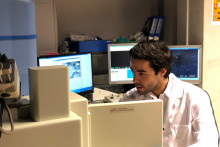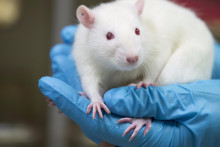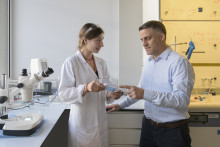UT researcher Agustin Enciso-Martinez recently became the winner of the Academic Publishing Bootcamp organized at the University of Twente. The title of his winning paper is ‘Characterization and identification of tumor-derived extracellular vesicles by means of scanning electron microscopy and Raman spectroscopy’. Certainly a mouthful, but Martinez explains the importance of his PhD work.
Academic Publishing Bootcamp
Academic Publishing Bootcamp is an intensive workshop for PhD candidates at the UT. During this three days long course, the participants learn about the entire process of writing a manuscript and getting their article published.
Enciso-Martinez is a member of the Medical Cell BioPhysics group, which focuses on understanding of cancer biology and developing technology that can improve the diagnosis and treatment of the disease. Together with his colleagues, Enciso-Martinez works on the detection and characterization of tumor cells and tumor cell products circulating in the blood.
‘Finding a needle in a haystack’
‘Cancer patients first get a primary tumor. However, these tumor cells get into their blood stream and can at any point settle in another tissue and form a secondary tumor, to which we refer as metastasis. And metastasis is the cause of 90% of cancer deaths,’ says Eciso-Martinez. ‘Circulating tumor cells (CTCs) are responsible for metastasis. Hence, it is crucial to detect them early.’
Eciso-Martinez is working on detecting these cancer markers in patients’ blood. ‘This is so called liquid biopsy, so a biopsy that – unlike others – doesn’t require any surgical procedure,’ he explains. ‘This method could be ideal for diagnosis or therapy monitoring, or perhaps even general prevention of cancer, but unfortunately it’s extremely difficult to find the circulating tumor cells in blood samples. There are very few of them. It’s like finding a needle in a haystack.’

Search for vesicles
There might be another way to approach the problem, though. ‘Recent studies show that tumor cells release particles into their environment, so called extracellular vesicles. And the concentration of the tumor vesicles in blood is much higher than that of CTCs,’ clarifies Enciso-Martinez, whose task is now to identify these extracellular vesicles in blood.
Within his PhD research, Enciso-Martinez first aims to characterize the specific morphology and chemical properties of the tumor vesicles using a combination of two methods: scanning electron microscopy and Raman spectroscopy. If he is successful, Enciso-Martinez’s findings can be used to directly identify the vesicles in patients’ blood, and therefore detect cancer in an early stage. As the researcher puts it: ‘The death rate due to cancer shows no sign of abating. This makes it an urgent challenge to tackle.’
Cancer-ID
The research of Agustin Enciso-Martinez is a part of the Cancer-ID program. The program includes a large consortium of partners all over the Netherlands, who work together to develop novel technology for monitoring cancer therapy through revealing the extracellular vesicle identity.







